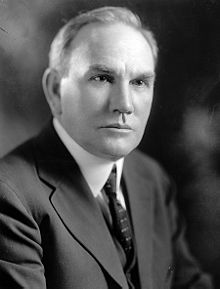Hampton Pitts Fulmer (June 23, 1875 – October 19, 1944) was an American politician of the Democratic Party. He represented South Carolina in the United States House of Representatives from 1921 – October 19, 1944. After his death, his wife Willa L. Fulmer took over his seat.
Hampton Pitts Fulmer | |
|---|---|
 | |
| Member of the U.S. House of Representatives from South Carolina's 2nd district | |
| In office March 4, 1933 – October 19, 1944 | |
| Preceded by | Butler B. Hare |
| Succeeded by | Willa L. Fulmer |
| Member of the U.S. House of Representatives from South Carolina's 7th district | |
| In office March 4, 1921 – March 3, 1933 | |
| Preceded by | Edward C. Mann |
| Succeeded by | Constituency abolished Tom Rice after constituency reestablished in 2013 |
| Member of South Carolina House of Representatives from Orangeburg County | |
| In office January 9, 1917 – March 6, 1920 | |
| Personal details | |
| Born | June 23, 1875 Springfield, South Carolina |
| Died | October 19, 1944 (aged 69) Washington, D.C. |
| Resting place | Orangeburg, South Carolina |
| Political party | Democratic |
| Spouse | |
| Alma mater | Massey Business College |
| Profession | Farmer, businessman |
| Signature | |
Early life and education
editFulmer was born near Springfield, South Carolina on June 23, 1875.[1] He attended the public schools and was graduated from Massey Business College in Columbus, Georgia in 1897. He engaged in agricultural and mercantile pursuits in Norway, South Carolina, and also engaged in banking.
He married Willa E. Lybrand in 1901, and they had three children.[1]
Political career
editFulmer was a member of the South Carolina House of Representatives 1917–1920. He was elected as a Democrat to the Sixty-seventh and to the eleven succeeding Congresses and served from March 4, 1921, until his death. While in Congress, he served as chairman, Committee on Agriculture (Seventy-sixth through Seventy-eighth Congresses). He had been nominated for re-election to the Seventy-ninth Congress before dying in Washington, D.C., October 19, 1944.
During World War II but before Pearl Harbor Fullmer was outspokenly pro-British, and he advocated providing Britain with military aid in their war against Nazi Germany. Fulmer also advocated American entry into the war. In 1941 he voted in favor of the 1941 Lend Lease Act.[2] Fulmer was buried in Memorial Park Cemetery, Orangeburg, South Carolina.
See also
editReferences
edit- ^ a b Snowden, Yates, ed. (1920). History of South Carolina. Vol. V. Lewis Publishing Company. p. 232. Retrieved June 29, 2024 – via Internet Archive.
- ^ "Voteview | Plot Vote: 78th Congress > House > 117".
- United States Congress. "Hampton P. Fulmer (id: F000417)". Biographical Directory of the United States Congress.